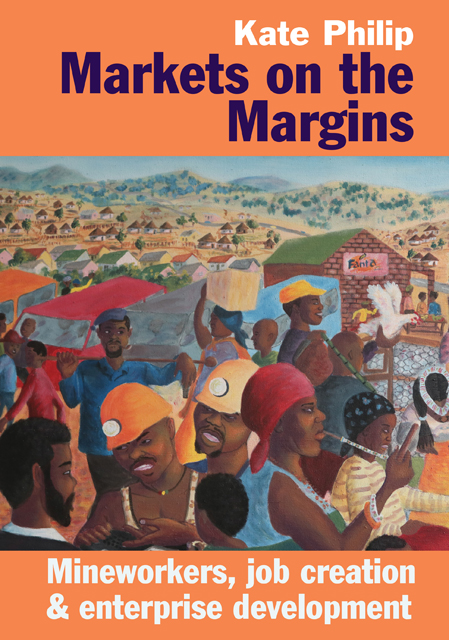Book contents
- Frontmatter
- Contents
- List of Illustrations
- Preface
- Acknowledgements
- Abbreviations
- 1 Introduction: Setting the scene
- 2 The 1987 Mineworkers Strike
- 3 Conflict in the Transkei
- 4 Power Struggles in Lesotho
- 5 Co-ops Capture the Imagination
- 6 The NUM Co-op Programme
- 7 Challenges of Democratic Ownership & Control
- 8 Rethinking Degeneration in Co-op Theory
- 9 The Mineworkers Development Agency’s Development Centre Strategy
- 10 Small Enterprise: In the shadow of the core economy
- 11 A New Enterprise Development Paradigm
- 12 Market Development – or a New ‘Anti-Politics Machine’?
- 13 Breaking into Higher-value Markets in the Craft Sector
- 14 Marula: Product innovation & value chains
- 15 Implications for Enterprise Development Strategy
- 16 If Markets are Social Constructs, how Might we Construct them Differently?
- Select Bibliography
- Index
9 - The Mineworkers Development Agency’s Development Centre Strategy
Published online by Cambridge University Press: 20 January 2023
- Frontmatter
- Contents
- List of Illustrations
- Preface
- Acknowledgements
- Abbreviations
- 1 Introduction: Setting the scene
- 2 The 1987 Mineworkers Strike
- 3 Conflict in the Transkei
- 4 Power Struggles in Lesotho
- 5 Co-ops Capture the Imagination
- 6 The NUM Co-op Programme
- 7 Challenges of Democratic Ownership & Control
- 8 Rethinking Degeneration in Co-op Theory
- 9 The Mineworkers Development Agency’s Development Centre Strategy
- 10 Small Enterprise: In the shadow of the core economy
- 11 A New Enterprise Development Paradigm
- 12 Market Development – or a New ‘Anti-Politics Machine’?
- 13 Breaking into Higher-value Markets in the Craft Sector
- 14 Marula: Product innovation & value chains
- 15 Implications for Enterprise Development Strategy
- 16 If Markets are Social Constructs, how Might we Construct them Differently?
- Select Bibliography
- Index
Summary
The early days of the co-op programme took place against the backdrop of the final stages of a repressive state of emergency in South Africa; unimaginable as it seemed at the time, the end of apartheid was just around the corner. In early 1990, the ANC and other banned organisations were unbanned; later that year, the task of representing the democratic movement to meet Nelson Mandela as he finally exited from Pollsmoor Prison went to NUM General Secretary Cyril Ramaphosa. By 1993, Ramaphosa was leading the country’s constitutional negotiations; within the democratic movement, the terms of a post-apartheid Reconstruction and Development Programme were under negotiation. A transition to democracy seemed plausible, if not yet certain. The idealised socialism of the imagination was not yet dead, even if the socialism of the Eastern Bloc was crumbling. It was a different era from the one in which the co-op programme had begun. It had new possibilities, new spaces within which to work and the promise of the transition to democracy ahead – with all the unknown territory this would entail.
Nevertheless, retrenchments in the mining industry continued unabated. In 1991, NUM initiated the first Mining Industry Summit, bringing together labour, the industry and government to negotiate a social plan to address the crisis of retrenchments in the industry. The outcomes were disappointing, with no commitment to limit retrenchments, and only a lukewarm response to NUM’s proposal for a wide-reaching social plan to address the development needs of mining towns and mine labour-sending areas.
Meanwhile, by 1993, the NUM Co-op Unit had drawn the conclusion that support to worker co-ops was not offering a sufficiently effective strategy for creating jobs for ex-miners at scale. The numbers of people able to benefit relative to the costs of set up and of ongoing technical support were just too low, with success rates and returns to participants low also. The approach was an insufficient response to the challenges confronted. We needed to reach far greater scale.
Close involvement of NUM’s National Executive Committee (NEC) members in mediating disputes at co-op level meant a high level of exposure to the challenges and to the limited gains this route offered to members.
- Type
- Chapter
- Information
- Markets on the MarginsMineworkers, Job Creation and Enterprise Development, pp. 93 - 110Publisher: Boydell & BrewerPrint publication year: 2018



